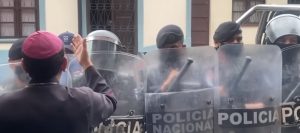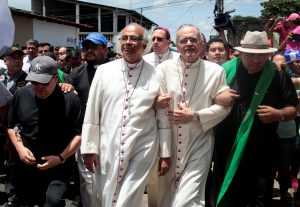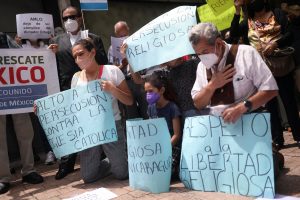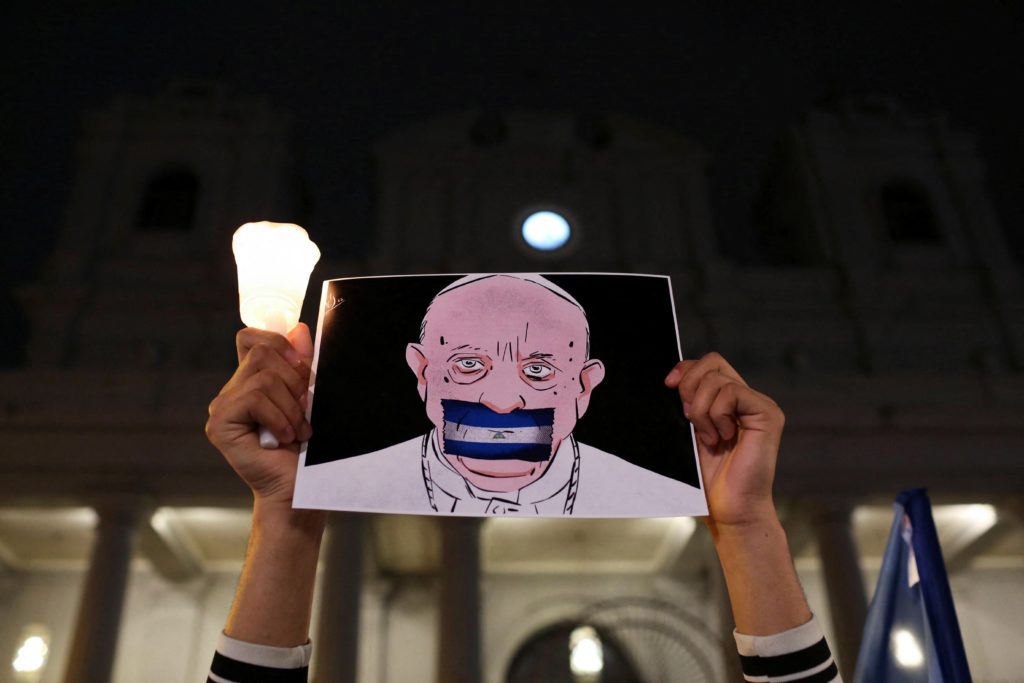ROME — As far as international crises go, the ongoing situation in Nicaragua may have less room for Vatican diplomacy than it might seem.
The ordeal of Bishop Rolando Álvarez of Matagalpa that has unfolded over the past few weeks has drawn international attention to the persecution of the Catholic Church by the government of President Daniel Ortega and his vice president and wife, Rosario Murillo.
It’s a steadily worsening situation that has seen priests thrown in prison, religious processions canceled by the government, and Catholics forbidden to enter their own churches — including in Matagalpa, where Bishop Álvarez was blocked from leaving his diocese’s headquarters. Last week, he was whisked away by police in the dead of night and put under house arrest in a family home in Managua.

Living the faith publicly has turned Catholics into criminals in the eyes of the Ortega-Murillo regime.
Pope Francis, who has spoken publicly about anti-Christian persecution and the fact that there are more martyrs today than in the Church’s first centuries, had stayed silent throughout on the state of things in Nicaragua, until Sunday, following Bishop Álvarez’ official arrest. At the end of the Angelus, the pontiff asked for “open and sincere dialogue,” without naming the prelate.
This diplomatic tack of public silence but behind the scenes, active diplomacy is not exclusive to Pope Francis, but has long been the Holy See’s brand of engagement.
Still, the pope’s quiet response is being questioned, and will be as long as the crisis in Nicaragua continues to unravel, and probably long afterwards. However, the pope’s public silence — the last time he had spoken publicly about Nicaragua had been 2019 — should not be dismissed as indifference on the pope’s part.
Several sources familiar with the situation have confirmed to Angelus that the Holy See has moved to intervene on Bishop Álvarez’s behalf. But the situation is even more challenging than what meets the eye.
On one side, Ortega’s crackdown has targeted a range of opposing voices, from politicians to business people and media, both secular and Catholic. The country’s bishops, particularly Bishop Álvarez, Bishop Silvio José Báez (an auxiliary of Managua who was forced into exile by Pope Francis in 2019), and Cardinal Leopoldo Brenes of Managua, are perhaps the most credible of those voices. Ortega needs to silence them.

On the other hand, there’s ample reason for the Vatican to be afraid of an escalation by Ortega.
The Church in other Latin American countries, like Chile and Brazil, has suffered crackdowns from dictatorial regimes in situations where the Church was the sole voice of opposition.
And then there is the “wild card” of putting the bishop in jail — not just house arrest. It is impossible to know what kind of provocation it would be for the faithful to see Bishop Álvarez in jail and in turn, what reaction from the government it might provoke. Yet beyond his vow of obedience, the Vatican has little pull on the bishop, particularly seeing that when Bishop Báez was ordered out, no provisions were made for him: He wandered around Europe for a while, eventually settling in Miami, where he tends to a large community of exiled Nicaraguans.
But what is happening in Nicaragua is something that should not only concern the Vatican or Catholics who worry for the future of their own. If the one loud, clear, and at least at this point, free voice of opposition is quieted, Ortega will feel unstoppable, and emboldened.
The impunity with which he has been repressing his own people is already having a domino effect in nearby countries such as El Salvador, Panama, and Guatemala, where leaders seem to skirt further away from democracy every day. If 30,000 Nicaraguans fled in a few weeks in 2018, what would the number of migrants and refugees be if the entire subcontinent fell prey to oppressive regimes?

And then there is also Russia to consider: As the world focuses on Vladimir Putin’s invasion of Ukraine, little attention is being paid to his growing footprint in Latin America, including in Nicaragua, where the army relies on Russian weaponry and mercenaries. A growing number of weapons in countries where they tend to go “missing” and fall into the hands of organized gangs poses a serious geopolitical threat.
The Vatican’s permanent observer in the Organization of American States is thus far the only official from the Holy See who has voiced concern publicly about this problem. Yet behind the scenes, it seems likely that Pope Francis and his people are worried.
They might feel it is still early enough in the crisis that an escalation can be prevented, or, like the international media at the moment, might be preparing to sharpen their focus.

